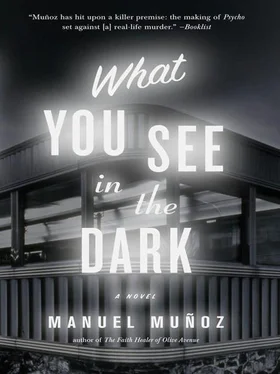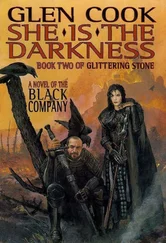Yet even after she made it inside, she kept looking out, with the same foolish impulse that forced her to run back into the house on some mornings to check the electric coffeepot, its unplugged cord coiled safely away. The trucker had remained asleep, the dog not barking, and she turned out the living room light, one window going dark, signifying motion to anyone who might be looking. But no one was looking. She knew this now. It was well past midnight and anyone still awake would be only half so, nodded off in front of the buzz and static of a television set, the local stations not able to fill insomnia’s empty hours. There was no need to be nervous, but she remained so as she walked into the kitchen, filling a teakettle with water and setting it to boil so she could ward off the chill of having been outside, wondering if her silhouette appeared in the windows, a ghostly form to an onlooker from the road. The ugly feeling was unshakable, that sense of being watched. Arlene reached over and turned out the kitchen light, one more light extinguished in the house, leaving her alone with only the blue flame of the stove, startlingly bright. So bright, she was surprised how easily she could manage a teacup from the cabinet, a spoon from the drawer. At the first sign of a coming whistle from the kettle, Arlene removed it from the stove, carefully pouring hot water by the glow of the blue flame, something to keep her eye on as she sat in the kitchen.
What’s a mother to do? Arlene thought. She saw her mother in the Bakersfield courthouse, her dedicated mornings of dressing up in her best outfit to sit through proceedings she could not possibly have understood completely, then coming home in the afternoon to air out the dress and make it ready for the next day. What’s a good mother to do? Willful and stubborn, sitting in silence while she heard exactly what her own son had been accused of. What’s a good mother? Arlene considered the chasm she had to cross to be like her mother, to be confronted with the irrefutable, yet still acknowledge her own flesh and blood. A son no matter what. Here is a knife. Here is a gun. Here is a bloody set of clothes. Here are your son’s hands. Deep down, she knew she could never be like her mother, long dead now. Upstairs, she remembered, was Dan’s bloody shirt on the dresser, but now she did not feel the sense of panic. There would be more to dig out of by trying to hide the shirt than by allowing its discovery. She would show the police officers, lead them right to it, her arms crossed over the flaps of her housecoat, and they would never think to inspect her garment and trace it back to an earlier moment of desperation.
Arlene sat at the table, warming her numb fingers against the teacup. There were hard days coming. Tomorrow, would she go to work? Would she be able to simply carry on with the business of the day, serving coffee, swiping change off the tables and dipping the coins into the pocket of her apron, making it clear through her silence that she would not be entertaining anyone’s nosy questions? How fast would the talk start swirling? With the patrol officers coming into the café at 6 a.m. on the dot for scrambled eggs and hash browns? Wouldn’t her face grow more severe by the hour? Wouldn’t her hair, pulled back in a bun, look even more like a gesture of resignation to her coming old age? Let your hair down, one of the young waitresses had told her, about six months after Frederick had left her, when it was clear to everyone that the male regulars had gotten wind of her situation. She had felt ashamed about it: feeling abandoned on the one hand, desired on the other. Not good enough for her own husband, yet not damaged at all in the eyes of the lonelier bachelor farmers.
But this was different. How much time would pass before people began to ask her questions directly? How thick would the silence be when she walked over to a table of customers and everyone politely gave their orders? Would it be better or worse if Dan were caught, arrested, and dragged back to Bakersfield? How would it look if he disappeared, Arlene still walking around free? The young waitresses would cross paths with one another in the back kitchen. The whole town would be talking about her. What kind of mother raises a son like that?
Sitting in the dark of her kitchen, Arlene wasn’t sure if the clarity was real, but she understood her mother now. With her hands on the teacup, she felt for the warmth, its measure, its certainty, the way she had felt the laugh rumble from Frederick’s chest, a discovery. She searched her own mind now in the same way, her own heart. What it took to sit in a courtroom when the entire world was against your son. What it took to sit there and know the silent judgment being cast upon you, the way you had to raise your head and walk in and out of the courtroom with conviction. Nothing you could do would bring back the victim everyone was grieving over. Nothing could be done in terms of real justice. Mercy wasn’t anywhere in the law. Neither was forgiveness. Or clemency. If it was, someone would have called out and said there were two mothers in the courtroom — why should they both suffer?
Could Arlene do that at least? Walk in and out of the café and face the day with her chin held high? Mrs. Watson. That woman. Her son. Long years awaited, whether or not she rose from the kitchen table, went back to bed, or remained sitting until dawn. Ahead were long years of being Mrs. Watson, with no one remembering Frederick, no one remembering she had a first name, even though it was on the red badge she pinned to her uniform every day. A waitress, but no one’s ex-wife. No one’s daughter, her family long gone. But everyone remembering she was the mother of that young man who had done that terrible thing.
She resolved to stay at the kitchen table until dawn. She resolved to stay until the police officer came with his inevitable questions. She resolved to point to the room at the back of the house and tell him what was in there. She resolved to tell him about what Dan had wanted her to do with the truck, how she had refused to do so because she was a mother. Arlene looked outside at the dark shape of the diesel truck and felt for the man inside. She had forced him to remain in the cold, huddled uncomfortably with his dog to pass the night, all because she hadn’t had the wherewithal to act like a woman first and not a mother, a person who cared about someone else’s well-being, not just her son’s.
Arlene thought about walking back out there and rapping on the door of the truck, showing the driver to one of the rooms and telling him with great apology that the fee would be waived. She decided against it, only because she was going to be facing life very soon — questions, suspicions, accusations — and these would be the last quiet hours she was going to have.
She thought back to that morning years before, when she had stood in the hallway of their old farmhouse, her brother maybe or maybe not in that back bedroom, and she had listened for some kind of noise to tell her that he was in there. Instead, her own mother rose and disturbed the quiet of the house. Arlene, honey, her mother had said. What are you doing up so early, my love? And then her mother began making an enormous breakfast in the kitchen.
The hours passed in the dark, Arlene transfixed by herself, by the silent truck in the parking lot, by the huge well of her coming life. The tea went cold. The blue flame burned. When the sky started to change over in the east, she finally rose from the table. She turned on the light. She took out eggs and sausages from the refrigerator, pancake mix from the cabinet. She set coffee to boil. She worked with resolve, remembering how her brother had walked into the kitchen to the smell of their mother’s cooking, his hair matted, and he made a playful grab for her and brought her to his lap as a cup of coffee was presented to him. The pans sizzled hot on the stove. Thank you, love, Frederick used to tell her, after their big Sunday dinners. Arlene made hearty portions and set everything on a breakfast tray — the coffee in a carafe, the eggs and sausages and toast and pancakes covered with a larger, upside-down plate to keep everything warm as she made her way outside and over to the truck.
Читать дальше












